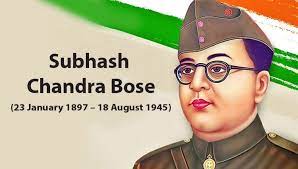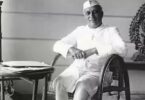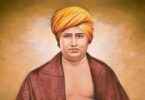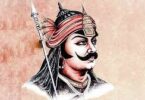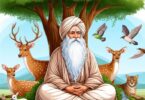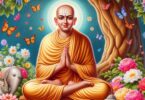It was 1942. The Second World War was going on in full swing. The Britishers were retreating against the furious attack of the Germans. In India, at such a time, Gandhiji declared “Britishers, quit India” and advised all patriotic persons to “do or die”. The British Govt. got terrified at this. It hanged hundreds of patriots and imprisoned thousands of them Including Gandhiji, Nehru, etc. Keen vigilance was maintained to ensure that no patriot was at large.
Amazingly, a well-known revolutiona- ry who was intermed, and was kept under police watch round the clock, sudden vanished from his residence. few months there after, all of a sudden, a new voice was heard on the Radio. It said, “This is Azad Hind Radio. I, Subhash speaking. Brethren, independence is within our reach. Give me your blood, I will give you freedom.”
That great and born revolutionary, who, in spite of his deep regards for Mahatmaji, did not believe in non-violence, he, who very tactfully escaped from imprisonment, formed an army abroad called Azad Hind Army, and who spread thus inspiring message on the Radio, was Subhash Chandra Bose.
Subhash Bose was born at Cuttack on 23rd January, 1897. His father Rai Bahadur Janakinath Bose was a very prominent lawyer, and wealthy and influential person. He desired to see his son in a top-ranking Government post. But Subhash was of a different temperament since his childhood.
As a student Subhash was very brilliant. He passed Matriculation in 1913 and stood second in the University. Then his father sent him to the famous Presidency College of Calcutta for higher education. While studying I.A., Subhash felt an urge for forsaking the worldly life and to be a sage. He felt for the Himalayas which is the abode of many sages. Here he saw a sage who impressed him most. When Subhash reques the sage to accept him as his disciple, the sage told that he cannot attain success in spiritual life without the prior permission of his parents. So, Subhash went back and re-continued his studies.
He did very well in I.A. and stood third in the Calcutta University. While reading B.A.,the First World War began. The Britishers set up several military training camps to train young men who may fight as soldiers if necessity arises. The proposal attracted Subhash. He joined such a camp, received thorough military training and since then he developed a special attraction for military life.
After graduation Subhas was sent to England for being an I.C.S. He came out successful. At that time, high posts were reserved for persons who have passed the I.C.S. test. So, easily Subhash could have got such an appointment. But he was not born to serve. He was a born fighter. So, without accenting any service, he waited for the proper opportunity which appeared .
in 1921. In 1921 Gandhiji started his non-co-opertation movement. Subhash eagerly participated therein. Due to his burning patriotism and the military discipline he learnt, he exceeded all in organisational works. Later, he was elected Mayor of Calcutta Corporation, made a member of the Congress Working Committee and was also elected as the President of the Indian National Congress held in 1938 at Haripura. But, as told earlier, Subhash did in 193 not believe in non-violence. So, he left Congress and formed a militant party named “Forward Block” in 1939. His aim was to fight the Britishers out of India. Within this period he had sent about seven years in British jails on charge of anarchy and revolt.
Since the outbreak of the Second World War in 1939, Subhash secretly tried to contact anti-British countries and to remove British rule from India with their military assistance. The C.I.D. department got a smell of it. So, he was interned at Calcutta in 1941. But in 1942 he tactfully escaped, crossed ar the border of British India in disguise. He first went to Germany, is met Hitler. Hitler was glad to see his patriotism, and bravery. of He advised him to go to Japan as it is closer to India. So, Subhash reached Tokyo by a German Submarine. By then the Japanese army had occupied Burma. The Govt. of Japan highly respected Subhash and helped him to form an army with Indians at Burma and some Japanese soldiers to drive the Britishers out of India. That army was called Azad Hind Fouz and as is supreme commander Subhash was called “Netaji”. He actually occupied up to Manipur. But fate ordained otherwise. Germany a and Japan were defeated. What happened to Subhash is yet a in ambiguous form. But it is a truth that he is one of the greatest and bravest patriots of modern India.


